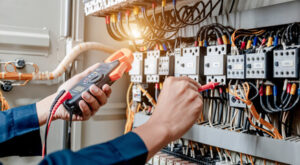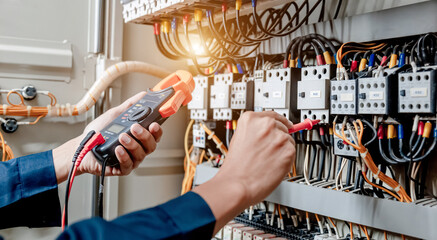Electrical installs are vital add-ons to any home or business, and they must be professionally completed. But what exactly is electrical installation work?
Electric wiring is a series of wires that provide power to lights and appliances. The wires can be single-conductors or multi-conductors, and they’re subject to specific safety standards based on their operating voltage and current capability.

Residential
Whether you’re remodeling your home, installing new lighting fixtures, or simply adding an electrical outlet, it’s important to know the basics of residential electrical wiring. It’s also critical to be aware of when you need to consult a professional electrician or when you can tackle the job yourself. You’ll also want to be sure that your work complies with residential electrical codes.
Typically, a residential electrical installation will consist of all the equipment and wiring that supply power to the house. This includes a switchboard, lighting, socket outlets, and appliances. The switches and receptacles must be connected to the distribution board by wires. The wiring must comply with the National Electrical Code (NEC). This code is developed by a committee of experts, including tradesmen, manufacturers, and firefighters. It is also included in state and local building codes as a reference.
When a residential electrician works on an electrical installation, they’ll start by determining the size of the electrical service. This is the system of wires that runs from your electricity service provider to your home. It determines how much current your home can use.
From there, they’ll install the wires that lead to your home’s main panelboard, which is also known as a breaker box. The two large wires connecting to the breaker box are called hot wires and are used to provide electricity to your home. A third wire is referred to as the neutral wire, which is used to return electricity to the breaker box.
Then, they’ll install all of the switches, receptacles, and outlets in your house. The electrical system in a typical home can have up to 30 circuits, depending on the number of appliances and light fixtures. It’s essential to keep in mind that a single circuit should never exceed 10 amps. This will prevent the circuit breaker from tripping and ensure that your appliances are safe to use.
In a commercial environment, the wiring systems are usually more complex than those in homes or duplexes. Commercial environments often have high power requirements, frequent changes to the layout of equipment, and may be located in wet or corrosive conditions. In addition, many commercial facilities handle flammable gases or liquids, so special rules for wiring and safety will apply.
Commercial
Commercial electrical installations differ from residential projects in a variety of ways. Commercial spaces often require more power than homes and are subject to stricter safety regulations. For these reasons, it’s important to hire licensed professionals for commercial electrical installation projects. In addition to being fully licensed and insured, a reputable contractor should have extensive experience in commercial projects and a track record of completing high-quality work. When choosing a contractor, look for one who can provide references and reviews from previous clients. This will help ensure that the contractor is qualified to meet your needs and can complete the project promptly.
Electrical wiring is a crucial component of any commercial space. The type of wire used in a commercial space will vary depending on the building’s use. For example, a dance studio will need different wiring than a grocery store or an ice-skating rink. The commercial wire is usually made from a thinner metal than residential wiring and may be coated with a plastic insulator to protect the wires from moisture and other contaminants.
If you’re starting a new construction project, an experienced commercial electrician can help you design the right electrical setup for your business. This will ensure that your space is well-lit and has all the outlets you need to power your equipment. It can also help you avoid costly mistakes that could put your building’s occupants in harm’s way.
When installing an electrical system in a new commercial space, it’s essential to accurately determine the load requirements. This will ensure that the electrical system can handle the building’s power demands and is in compliance with local codes and regulations. Additionally, it’s important to install a system that will allow for future expansion or upgrades.
A commercial electrical installer will typically start the project by connecting the building to the municipal power supply. This will ensure that the power company can deliver the electricity to the building’s systems and appliances. After the connection is completed, the electrical installer will test and inspect the system to make sure it’s functioning properly. If any issues are discovered, the contractor will repair them as needed.
Industrial
An industrial electrical installation is the wiring and other devices that support the operation of a factory or plant. This type of wiring carries heavy loads and requires strict safety protocols to prevent electrical shocks and fires. It also must comply with Occupational Safety and Health Administration regulations and local building codes.
This type of electrical work is complex and requires a highly skilled professional. Industrial electricians are specially trained to work on high-voltage equipment and wiring that connects multiple machines and production lines. They can also install lighting systems, power distribution networks, and controls in industrial buildings.
Industrial electrical installations are typically large in scale and depend on a three-phase power supply. These are unlike commercial electrical installations, which typically use a single-phase supply and are more compact.
When it comes to industrial electrical installation, you want to be sure that your contractor is fully licensed and insured for all of the work they perform. They should also be bonded for any service repairs or emergency services that may occur. In addition, they should have a long history of experience in the industry and provide references for past clients.
An experienced industrial electrical contractor can help you save money on utility bills by improving your energy efficiency. For instance, a facility that uses a lot of electricity will benefit from upgrading to more efficient motors and lighting. These types of upgrades usually pay for themselves within a short period and reduce operating costs.
Whether your facility needs an industrial electrical installation or an upgrade, a reliable professional can make all the difference. A reputable professional will understand the unique needs of your business and offer you a customized solution that fits your specific requirements.
Electrical wiring is an important part of any industrial facility. It supplies current to all the equipment and machines in a factory or plant, so it must be safe, reliable, and properly installed. Industrial electrical installers must follow strict safety protocols and adhere to the national electric code. They must also be familiar with the latest technology in industrial electrical systems.
Emergency
A power outage can be a major problem, especially when it comes to food spoiling and equipment failing. Some people even suffer from carbon monoxide poisoning, which is caused by gas leaks in electrical appliances and can be very dangerous if you don’t get help immediately. An emergency electrician can help you deal with the problems that result from a power outage and make sure your family is safe.
Homeowners can install emergency generators to ensure that their homes are powered even during a power outage. They can also call an emergency electrician to repair the existing electrical system in their house. Oftentimes, these repairs can be done quickly and efficiently to prevent further damage to the property.
The national electric code lists several requirements that must be met by emergency and standby power systems. They include determining how much power you need by accounting for the number and wattage of all your systems and products. A good way to calculate this is by looking at your electricity usage over the past year. You can also add a buffer amount, such as 10% to 25%, for emergency purposes.
Another important requirement is locating the emergency wiring circuits in a safe place. These circuits must be placed far enough from the normal power sources so that a failure, fire, or explosion at one source does not jeopardize the emergency power supply. In hospitals, for example, it is specified that a Type 1 or Type 3 essential electrical system is required to provide backup power for medical patient care equipment.
If you hear humming or buzzing sounds coming from your electrical outlets, this is a sign that you have a serious problem. These sounds can be caused by overloaded circuits or old wires that are starting to deteriorate. They can cause a fire and harm your family. If you hear these noises, turn off the main power and contact an emergency electrician as soon as possible.
If you see a downed power line, do not touch it! These lines are high voltage and can be deadly if you come into contact with them. If you see this happen, call your local power company and a professional emergency electrician right away.
